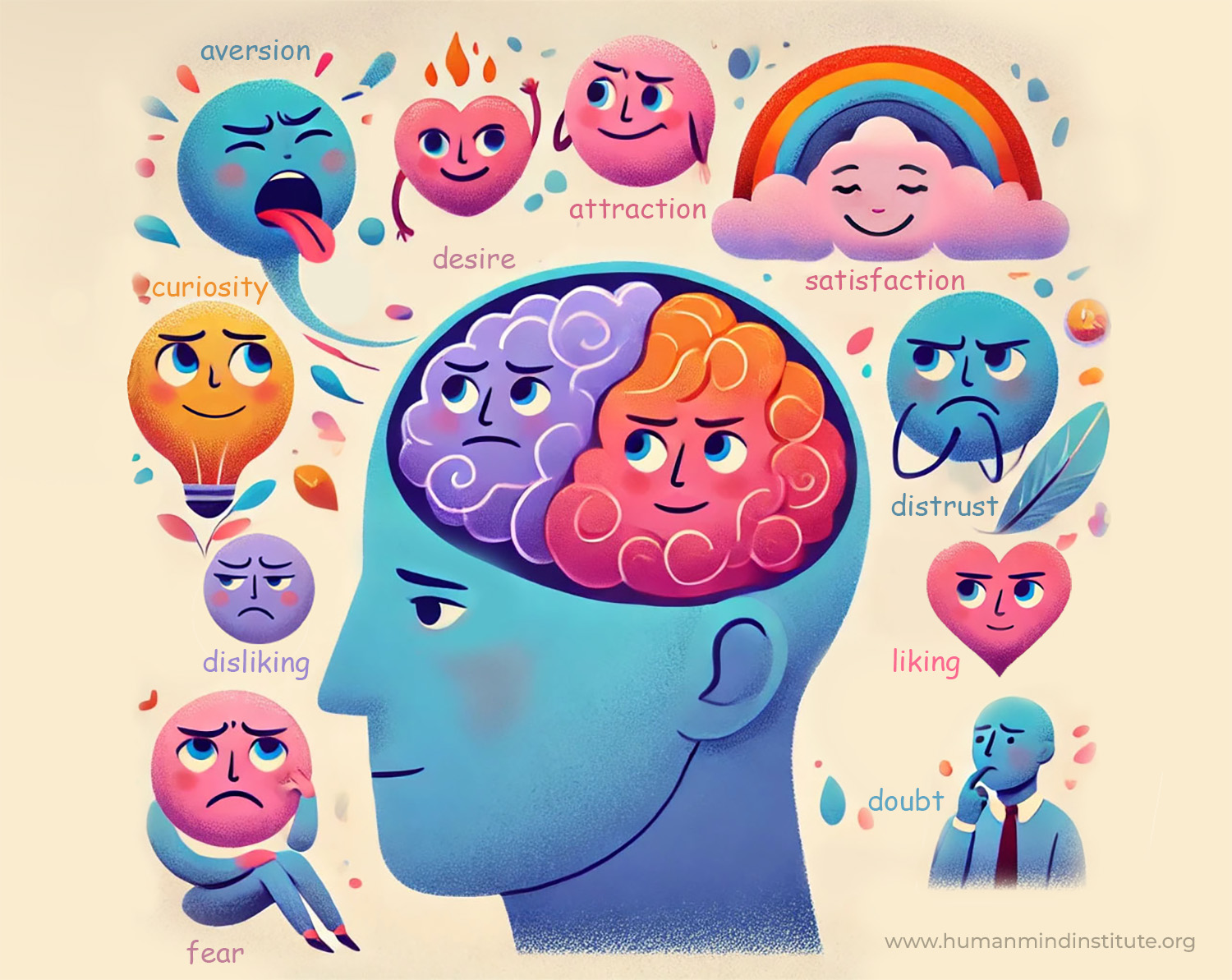Your Subconscious Brain Makes All Your Decisions Through a Competition of Emotions, but Your Conscious Mind Is a Key Influencer

If you investigate yourself carefully, you will discover that even if you consider yourself a highly reasonable person, all your decisions are made through a competition of emotions in your mind, and there is always one winning emotion that determines whether you will do one thing or another. During your decision-making processes, however, your conscious thinking can amplify or suppress certain emotions, thereby influencing which one will ultimately win the competition. To better understand how this mechanism works, think first about how animals make their decisions and how this process has changed as we evolved from animals to humans.
How Do Animals Make Their Decisions Without Higher-Level Conscious Thinking?

Imagine a cat, which lacks the higher level of conscious thinking that humans have. It makes all its decisions based on its feelings. As a curious animal, when it sees something interesting, it automatically feels an urge to go there and investigate it. However, if that interesting thing is in an open area with humans around, it will also feel fear about going there. The two emotions will begin competing, and the cat will hesitate. Depending on which emotion wins the competition in the end, the cat will either go or not. This is a genius solution of nature to help animals make decisions without the need for conscious thinking.
Human Decision-Making Is Simply an Updated Version of the Same Mechanism, Where Your Conscious Thoughts Can Amplify or Suppress Some of Your Competing Emotions

Humans make decisions in a fundamentally similar way. Imagine you have just come home, thinking about whether to go jogging or stay on the couch. Your emotional brain will give you the desire to go because you want to be fit and healthy. It will also give you the fear that if you don’t go, it may have negative consequences on your health, appearance, and physical condition. Both of these feelings are based on the default programming of your brain, which makes you fear anything that threatens your survival and urges you to engage in activities that support your survival. Nevertheless, your subconscious brain is also programmed to seek comfort and relaxation to save energy. Therefore, you may also feel aversion to go jogging and a desire to stay and relax on the couch.
All these emotions will begin to compete within you. However, unlike in the case of the cat, your conscious brain will begin to analyze and predict what would happen if you go, and what would happen if you stay. You will start to think about the consequences of each possible scenario. Your emotional brain will respond to each of your conscious thoughts by increasing or decreasing some of your competing emotions until one of the feelings wins, and you either go and do sports or stay on the couch.

Similarly, when you think about buying something, your subconscious emotional brain will induce different emotions in you. You may feel a strong desire to buy a certain item, but also have fears that it might be a bad decision. Then, your conscious brain will start to make logical analyses and imagine how your future would be after buying or not buying it. Some of your competing emotions will increase, while others will decrease, and the strongest emotion in the end will decide whether you make the purchase or not. If none of them wins, you will probably postpone the decision-making.
Even Highly Logical Decisions Happen at the Moment When Your Emotional Brain Gives You Enough Feeling of Trust
In fact, even when you think you are making a highly logical decision, the decision itself only occurs when your emotional brain responds to your logical brain’s reasoning by giving you a sufficient amount of trust. That feeling will lead to your final decision, not the logical reasoning itself. Therefore, for example, even if you can come up with amazing logical reasoning for why to invest in something, if you don’t succeed in convincing your emotional brain to trust your logic, you will not do it.

On the other hand, you probably make many decisions without any logical thinking simply because you trust a certain outcome based on your past experiences. This is what people also call intuitive decision-making, which can be absolutely correct and reliable if you have enough experience with what you are about to do.
Why It Is a Good Thing That Your Decisions Are Not Directly Controlled by Your Conscious Logical Brain?
If you think further, you will realize that it is actually a very good thing that your logical brain is not in charge of your decisions. In many situations in life, there are a lot of unknown factors and uncertainties. In such cases, your logical brain would get stuck during decision-making because it is not possible to make clear, logical predictions. Fortunately, your subconscious can bridge such gaps by giving you feelings of trust, hope, or acceptance of risks. This crucial role of emotions in decision-making also explains why scientific research shows that many people with damaged emotional brain areas have difficulties with making decisions.
Make Yourself Mindful of Your Inner Competition of Emotions and You Will More Easily Choose to Do The Right Things
By keeping yourself aware of the ongoing competition of emotions in your mind and learning to influence them, you can gain much more conscious control over your decisions. For example, you can convince yourself more easily to go and do sports instead of staying on the couch. You can consciously decide to drive your thoughts in the direction that will increase positive feelings that support going and avoid thoughts that would support staying. For instance, you can practice visualizing yourself putting on your sport shoes, going out of the door and start jogging with an absolutely joyful mindset.

Imagine feeling a light breeze gently brush against your face and the fresh air filling up your lungs. You feel light and the physical effort that you put in the movement activates your body. Your whole nervous system is getting energized. Your blood, and all your other body fluids are flushed through your tissues, like an inner shower, cleaning and rejuvenating your cells and organs.
During this visualization exercise, you should consciously avoid thoughts that would amplify the feelings driving you towards the couch. You can also remind yourself that you always feel good and never regret doing sports afterward, but often regret skipping it.
Similarly, if you feel a strong desire to buy something that you will probably regret in the future, by consciously managing your competition of emotions, you can more easily resist buying it. Take some time to visualize yourself in the future regretting the purchase, and also imagine yourself being absolutely happy and satisfied without having that item.
Consciously Influencing Your Inner Competition of Emotions Is One of the Most Powerful Ways to Rapidly Improve Your Decision-Making Skills
In fact, most of our thinking processes involve cycles of analyzing, predicting, and making decisions. Therefore, learning to make better decisions by mindfully observing and consciously influencing your competition of emotions is one of the most powerful self-development practices. The decisions you make in your life are the most important defining factor of what will happen to you in the future. For this reason, if you want to be more of a conscious creator of your future, it is essential to become a more conscious creator of your decisions first.
If you know people who could benefit from reading this article, send it to them using one of the following share buttons.
If you want to understand more about how subconscious processes influence your thinking, read our upcoming articles, follow us on social media, or discover more through our insightful book, Human Mind.
By subscribing to our newsletter you can receive updates about interesting topics on neuroscience and gain free access to premium content.
